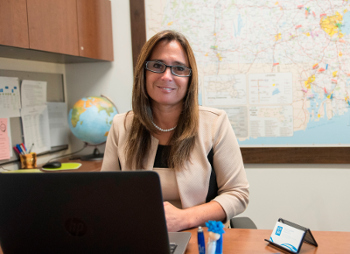Do you have a question about JRI services?
One thing I often see caregivers struggle with is how to discipline their baby, toddler, or preschooler. They're so little; how do you decide when to start disciplining them? And once they get to be a "Terrible Two" or a "Threenager," how do you correct, and maybe even prevent for next time, behavior that is challenging?
I went to a training in the summer of 2017 about the Positive Discipline parenting approach. The training had some great tips, although a lot of it was geared toward older children.We have a book at the office about it if you are interested, and you can check them out here: Positive Discipline for Parents.Because there is so much I want to say about this topic, I am dividing it into several blog posts.
When you find yourself getting angry at your child or starting to discipline him, ask yourself, "What is the worst that could happen here? Is this behavior unsafe or unkind? Is this my issue (i.e., I am annoyed and don't like it), or is this really something my child should not be doing?" Sometimes we say no to children reflexively, because of the way we were raised, because we are concerned about being judged by other adults for the child's behavior, because what he is doing is uncomfortable or annoying to us, or because weare hungry, tired, cranky, etc. Often, children ask questions or say things that seem rude to adults, but they are not trying to be disrespectful--they are genuinely curious and don't know any different. And sometimes they take a toy from another child or crash into someone because they are so caught up in their own wants and experience, not because they are mean or bad.
Once you have decided that this is a situation where you need to say no, then what? If your child is doing something that could very immediately lead to harm to him or someone else, you need so say something right away.
Try to save your big, angry, loud voice for when your child is doing something truly unsafe--running into the street for example. If you yell all the time, they will tune you out.
If the behavior is not imminently dangerous, then you can think a little more about your response, and try to deliver it in a calm, even--but serious--voice. But what should your response be? What does discipline for young children look like?
How you discipline your child is your decision, and discipline will look different in different families and with different children. If you can, set aside a time to think about what your approach will be and to talk it over with your partner or any other major caregiver in your child's life. Then, even if you do stray off track sometimes, at least you have some principles to come back to and to guide you. The following are some things to keep in mind when you have that discussion.
The first important point to remember is that discipline, when done well, does not mean punishment. Ideally, you are giving your child an appropriate consequence for behavior which is unsafe or unkind.
Understanding children's motivations and trying to take their perspective can be really helpful in correcting their behavior. Often, when children "act out," it is because they are looking for attention or are overwhelmed by a task. One of my favorite sayings from the Positive Discipline workshop was, connection before correction. Your child needs to feel connected to you in order to feel invested in doing what you are asking him to do. And he may be acting up because he feels a lack of connection with you at that moment.
It can be very hard to connect with or to be sympathetic to a child who is throwing a tantrum, but try something as simple as validating her feelings. "I hear you. You are so mad." Then just leave it for a minute. Don't immediately come in with, "But it's time to turn the TV off. You have watched too much already today. Why don't you go play with all those toys you have in your room?" Think about when you are mad. Do you want someone to immediately tell you why you shouldn't be mad, or what you should do to fix the problem? Sometimes it's nice to have someone just listen and tell you they understand how you feel.
It is also helpful to remember that whatever we focus our attention on, children will do more of. We want to focus on the behavior that is: kind, helpful, and safe. Humans are wired to seek belonging. So if we can show our children that when they act in ways that are kind and safe they are more connected to us, then they will "behave" more. There is also the saying, "catch them being good," which means to notice when your child does something you want her to do, and tell her that you see it and praise her.
Ideally, your discipline of your child will be looking towards the future, and a lasting solution to the problem that caused the unwanted behavior. When you punish a child, you remind them of the mistake and the past; when you look to the future, you try to find a solution in order to avoid the behavior altogether. Can you set up situations so that your child will not behave in this way next time? Can you remind your child of the consequence before you enforce it so that she chooses to behave differently?
If you want to read more about discipline now, here is a great article on discipline from Zero to Three. In our next post, we will talk about consistency, age-appropriate expectations, and setting your child up for success.



